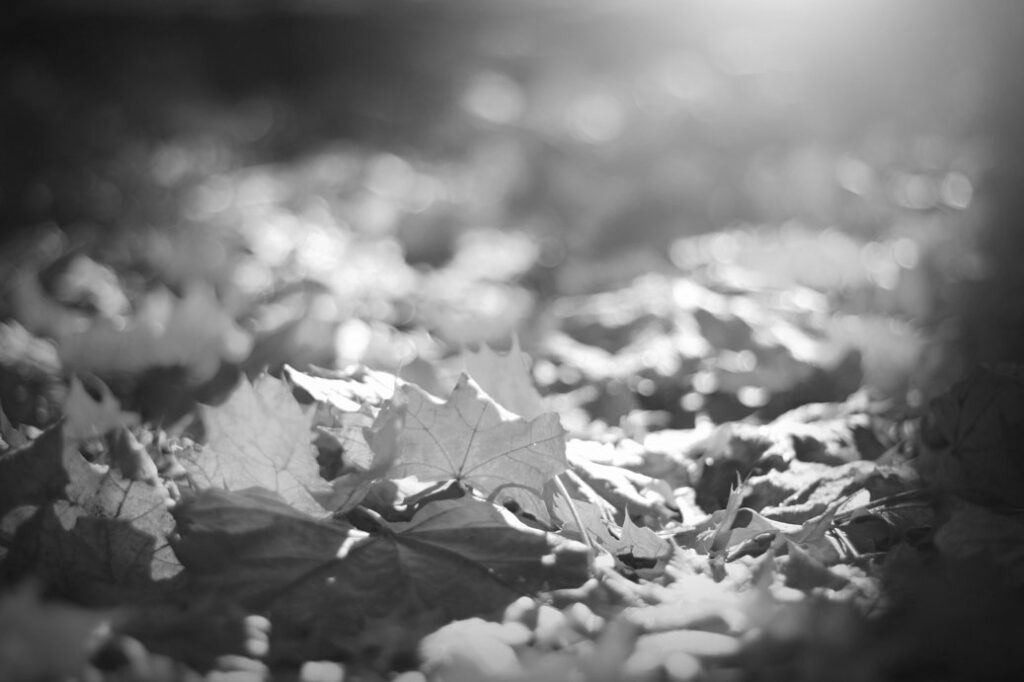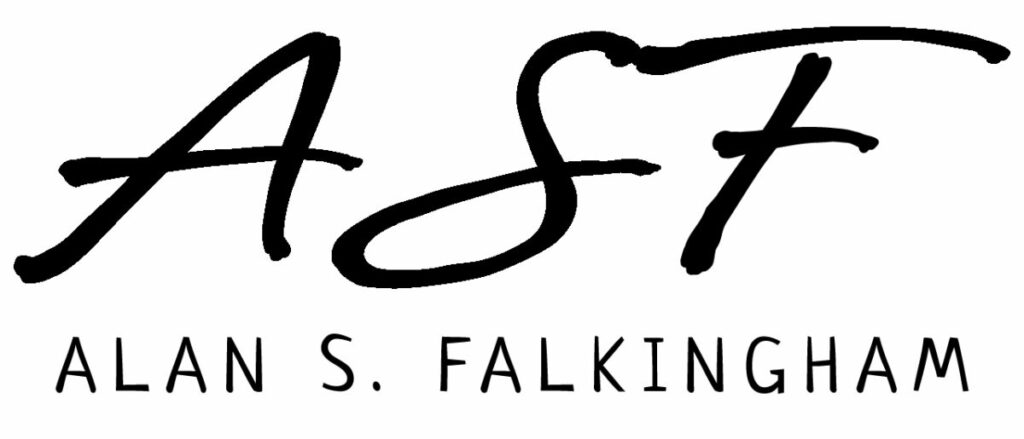
Leaves on Frozen Ground
I griddle eggs. Over easy, the way he likes them. The way he demands them.
The bastard adds hot sauce, dabbing it on, like he is ejaculating, butters a slice of toast until
yellowness pools in the soft, warm center. And then he begins to eat, in silence.
I cross my arms and lean against the kitchen counter, staring off into the middle distance,
restless. After a while, the sound of his fork on the plate is too much for me.
“You can lose most anything. If you try hard enough. You read about it all the time.” I say it
suddenly. But the idea is haphazard. The shape of cliffs in the mist.
“What did you say?” He does not even look up, passing judgment on me with his disinterest.
Glass eyes and wooden legs, a wedding ring. Kids whose parents thought they were sleeping
safely in their beds. Objects that magpies steal because they are shiny and bright. Years that
pass by like smoke disappearing up a chimney.
I think immediately of all these examples, but they seem too…..dramatic maybe? The bastard
hates drama. He says my depression is me being over-emotional. That if I was stronger, more
resilient, I could find my own way out of this difficulty that I seem to be lost in.
Difficulty?
So, I keep the examples to myself.
“But not this. I can’t shake this. Just cannot lose it. No matter how hard I try. You know what I
mean?”
I can tell he doesn’t, by the way that he chews; round and methodically, like a cow working the
cud. But then again, how could he know? If he has not experienced it, for himself? Even I
cannot blame the bastard for that.
The thing is, even I don’t really know what “this” is. Because it changes. Sometimes it is a lone
bird flying across a sky, so colorless you cannot even really describe it as gray. Other times it is a
rectangular grave, dug in the black, black earth, fenced in by all the people that I have ever
known. Often it isn’t even visual. The anchor-deep sense of failure. Or anxiety, guilt, and shame,
intermingled and bitter tasting like licorice. Or the smell of treacly memories left to burn
against the bottom of the pot. Perhaps I am going mad, exactly as the bastard says.
“I just feel so lost sometimes. Aimless in a way…..” My voice peters out and I hear it with a
different cadence and a different tone, like I am outside my own body. I realize how it sounds:
pleading and pathetic.
He peers over the top of his readers, annoyed that I have interrupted his analysis of the box
scores. I peaked at them one time. Secretly, as if intercepting some foreign cypher: ERA, OBP,
1-3, HBP, GIDP. Things I do not understand but that he now studies because I have ceased to be
interesting enough to him. We can lose that easily enough it seems.
It is not like he has fared any better in my affections. I hate him in mundane, straightforward
ways. The leather driving gloves he wears, how he crunches handfuls of hazelnuts while he
watches TV. The way he shines his shoes with bees’ wax polish, using a soft cloth that he moves
in little circles until they gleam. Whenever he clears his throat, it makes me involuntarily tilt my
head. like a piano tuner listening for a precise timbre. I despise it all, never uttering a word.
“What did Doctor Jonathan Rubenstein say? About dosing and such?”
Dosing and such?
I think about our wedding day. Him in his blue suit. So handsome, despite his weak chin. I was
already both certain and doubtful in equal measures. Because my mother had warned me that
sometimes the most urgent feelings aren’t always the most important. She had said it, more for
her own benefit rather than for mine, with a look that disappeared like perspective to its
vanishing point. A matter of fact she had learned painfully, somewhere along the road. I
thought she was wrong, until I discovered that she was right.
“He didn’t.” I dislike Dr. Jonathan Rubenstein, but the bastard says I need him and, that is the
one thing he is right about.
“You had previously indicated you were going to discuss Esketamine with him.”
Previously indicated?
“We didn’t talk about that.”
Me and the bastard; this tired dance. He has an opinion on everything, and I evade him, my
tiny, will-o’-the-wisp victories.
He clears his throat in disapproval and I tilt my head involuntarily. Satisfied that he has made
his point, he goes back to the box scores.
Why don’t you go fuck yourself? I scream it silently, like hogs being slaughtered in the stock
yards when the wind is blowing a certain way, pigs’ blood still running quietly in the drains.
“The Orioles are only three games back,” the Bastard muses. Back to normal.
The ice in my coffee clinks on the edge of the glass when I tip it back and the sound reminds me
of young lovers screaming on a tilt-a-world. Half-afraid, half-excited. I don’t exactly know why,
but my senses have become more acute recently. And less so too, sometimes, if I deliberately
overdose, which I do from time to time.
That gets me thinking about the pills. My rainbow friends. The ones prescribed by Doctor
Jonathan Rubenstein.
After the bastard leaves for work, I drift back to the bathroom and swallow a handful of them
out of the cabinet. Our cat slinks along the edge of the sink, leans down and licks droplets of
water from the faucet, looks at me funny. It is a good cat. Friendly in a way that cats usually
aren’t. I pick it up and stroke its cheek. Eventually it slips out of my grasp and onto the floor,
moving like liquid.
You can lose everything if you try hard enough.
When I shower, I turn up the water temperature until it is on the edge of painful, so that it
makes my skin pink and tingling. Once I can stand it no longer, I step out and wrap myself in a
towel. I enjoy how soft it feels, the wetness still on my face, hair slicked back and smelling of
coconut. Newborn in a way. Lighter somehow.
When I look out the window, I see him. The yard guy, flicking away with his blower at leaves on
the frozen ground, mist lingering, low and flat in a murky silent blanket.
He looks up, for some reason, Luck perhaps. He is built like a middleweight, not a spare ounce
to carry, with thick biceps and forearms that remind me of logs for the fire. Cleaved is the word
that pops into my head, because his lines are so clean and straight, I suppose. The muscle meat
and the bone.
When he sees me watching him, he gives a little nod. An acknowledgment, nothing more. A
connection, but one that is meaningless. Just a habit. The sort of thing people do.
I smile back. The way people do.
But then, on impulse, I let my towel fall away and just stand there. I am not sure what
possesses me. I feel confused, embarrassed, but also momentarily satisfied. It is not that I am
any kind of looker. With a belly that hangs not quite tight, and too-thick thighs. But I am not
exactly out of shape either. Not that the bastard would ever care. Or even notice.
The yard guy looks again, and gives a smile, this time both mischievous but also hesitant and I
wonder for a moment about who he is. Where he comes from, if he reads the box scores or has
a wife who cooks eggs for him.
All things he could lose. If he even wanted to.
I consider whether to go downstairs. Let him inside. But somehow that feels too predictable.
The forty-something wife, in the kind of neighborhood that can afford a yard service. Bored and
searching for re-assurance. Like a needle puncturing skin. There, and then gone again, just as
quickly.
Instead, I just keep standing there, naked, watching him walking back and forth beneath our
grand old oak tree that clings to its leaves until the backbone of Fall is finally broken and frost
creeps in and steals them.
All the things we think we cannot lose.
As he works, he glances back up at the window every so often, confused, titillated, feelings he
cannot fully explain. Eventually, when all the leaves are in a pile, he gives a little shrug. has no
choice but to move away across the frozen ground. Until, with one last, secretive glance, he
disappears from view.
And I think about the difference between what you cannot lose but what you can leave behind.
How, when the bastard comes home from work, expecting dinner, I will be gone.
